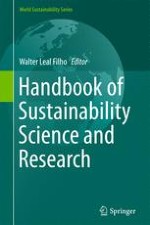2018 | OriginalPaper | Buchkapitel
Transition Towards Sustainability in Hull University Business School: A Study of Curricular Sustainability in the Teaching Processes
verfasst von : M. Ángeles Murga-Menoyo, Fernando Correia, Ángela Espinosa
Erschienen in: Handbook of Sustainability Science and Research
Aktivieren Sie unsere intelligente Suche, um passende Fachinhalte oder Patente zu finden.
Wählen Sie Textabschnitte aus um mit Künstlicher Intelligenz passenden Patente zu finden. powered by
Markieren Sie Textabschnitte, um KI-gestützt weitere passende Inhalte zu finden. powered by
